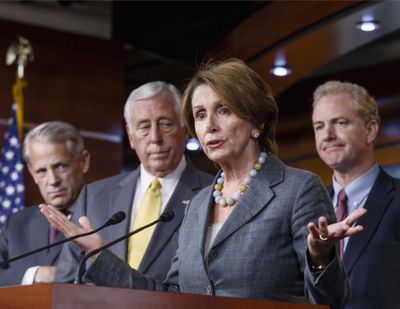Pentagon to recall civilian workers

WASHINGTON – The urgency to end the government shutdown eased Saturday as the Pentagon said it would recall nearly all its furloughed civilian employees and House Republicans shifted their attention to a broader budget battle with the White House.
Defense Secretary Chuck Hagel’s surprise announcement to call about 350,000 civilian defense workers back to work was expected to loosen pressure on Congress and the White House to quickly end the shutdown, which was in its fifth day Saturday. About 800,000 federal employees in all have been idled.
Republican leaders already had focused on their next point of leverage to extract political concessions from the White House: the need to raise the nation’s debt limit by Oct. 17 or risk a default.
President Barack Obama reiterated his refusal to negotiate with House Speaker John Boehner, R-Ohio, and other Republican leaders until they agree to reopen government and raise the $16.7 trillion debt limit to cover spending that Congress previously approved.
“I’ll always work with anyone of either party,” Obama said in his weekly address. “But not under the shadow of these threats to our economy. I won’t pay a ransom in exchange for reopening the government. And I certainly won’t pay a ransom in exchange for raising the debt ceiling.”
The House, which met in a rare Saturday session, unanimously approved legislation to ensure back pay for furloughed government workers. The Senate, which was also in session, was expected to approve the bill, which the White House has said the president would not veto.
The current budget impasse began as a tea party drive to halt Obama’s health care law. But it has become clear that the Republican strategy has changed to using the shutdown to challenge the size and scope of government.
“We’ve used just about every arrow in our quiver against Obamacare. It has not been successful,” said Rep. Doug Lamborn, R-Colo. “So I think we do have to move on to the larger issues of the debt ceiling and the overall budget.”
In exchange for what were once routine votes to raise the debt limit, Republicans want to pursue a grand budget bargain with the White House to reduce the nation’s overall debt.
Republicans want to cut Medicare, Social Security and other government spending programs as part of a package proposed by Rep. Paul Ryan, R-Wis., the Republican nominee for vice president last year.
They also are pushing other policy priorities, including an overhaul of the tax code and speedy approval of the Keystone XL oil pipeline between Canada and the United States, which many environmentalists oppose.
Democrats doubt that Boehner can corral his often intransigent conservative flank into a broad budget deal, especially since his previous efforts have failed. The 2011 debt ceiling showdown hit a stalemate that left the nation with a lowered credit rating.
Democratic leaders in the Senate said Boehner must allow the government to reopen before they would engage in talks.
“You can’t say keep the government shut until we come up with a grand bargain. That’s unrealistic,” said Sen. Charles Schumer, D-N.Y.
With Congress deadlocked, the Pentagon found a temporary solution by unexpectedly announcing that it would call back most of its furloughed civilian workforce.
Hagel made the decision after Defense Department lawyers said it was legal under the Pay Our Military Act, a measure passed by Congress shortly before the shutdown began on Tuesday, officials said.
Hagel said in a written statement that lawyers concluded that the law permits recall of workers “whose responsibilities contribute to the morale, well-being, capabilities and readiness of service members.”
The Pentagon is moving to identify “all employees whose activities fall under these categories,” and it expects to “significantly reduce – but not eliminate – civilian furloughs under this process,” Hagel said.
A Pentagon memo said civilian workers involved in health care, suicide prevention, repair of weapons systems, training and supply and human resources would be eligible to return to their jobs. Defense workers in commissaries and in payroll, legal and administrative jobs also are eligible.
The Pentagon’s comptroller, Robert Hale, said those recalled would include some who work for the Defense Intelligence Agency, the National Security Agency and other Pentagon-based intelligence agencies.
He said the shutdown means there is no money to order supplies or equipment for most normal operations. “We don’t have authority to enter into obligations for supplies, parts, fuel, et cetera, unless it is tied to a military operation,” he said.
Hale said several thousand civilian employees will remain on furlough. They include public affairs officers, financial officers and auditors.
With rising public complaints about the closing of national parks and monuments, and anger by federal workers sent home indefinitely without pay, House Republicans have begun a strategy to fund popular operations.
The House has approved bills to reopen national parks, continue potentially lifesaving treatments at the National Institute of Health and fully staff the Federal Emergency Management Agency, among other high-profile programs. Most of the bills had Democratic support.
Senate Democrats have largely ignored those bills, however, saying the full government needs to resume operation.
Senate Majority Leader Harry Reid, D-Nev., said Saturday that those operations “are certainly worthy. But there are many other needs that will go unmet and priorities that will be ignored without fully reopening the government.”
Some lawmakers acknowledged that the shutdown has begun taking its toll.
“It’s not good,” said Rep. Mike Coffman, R-Colo., about calls coming to his office from constituents. “They’re upset with the shutdown, upset about the gridlock, that Congress can’t come to an agreement. People aren’t happy about that.”